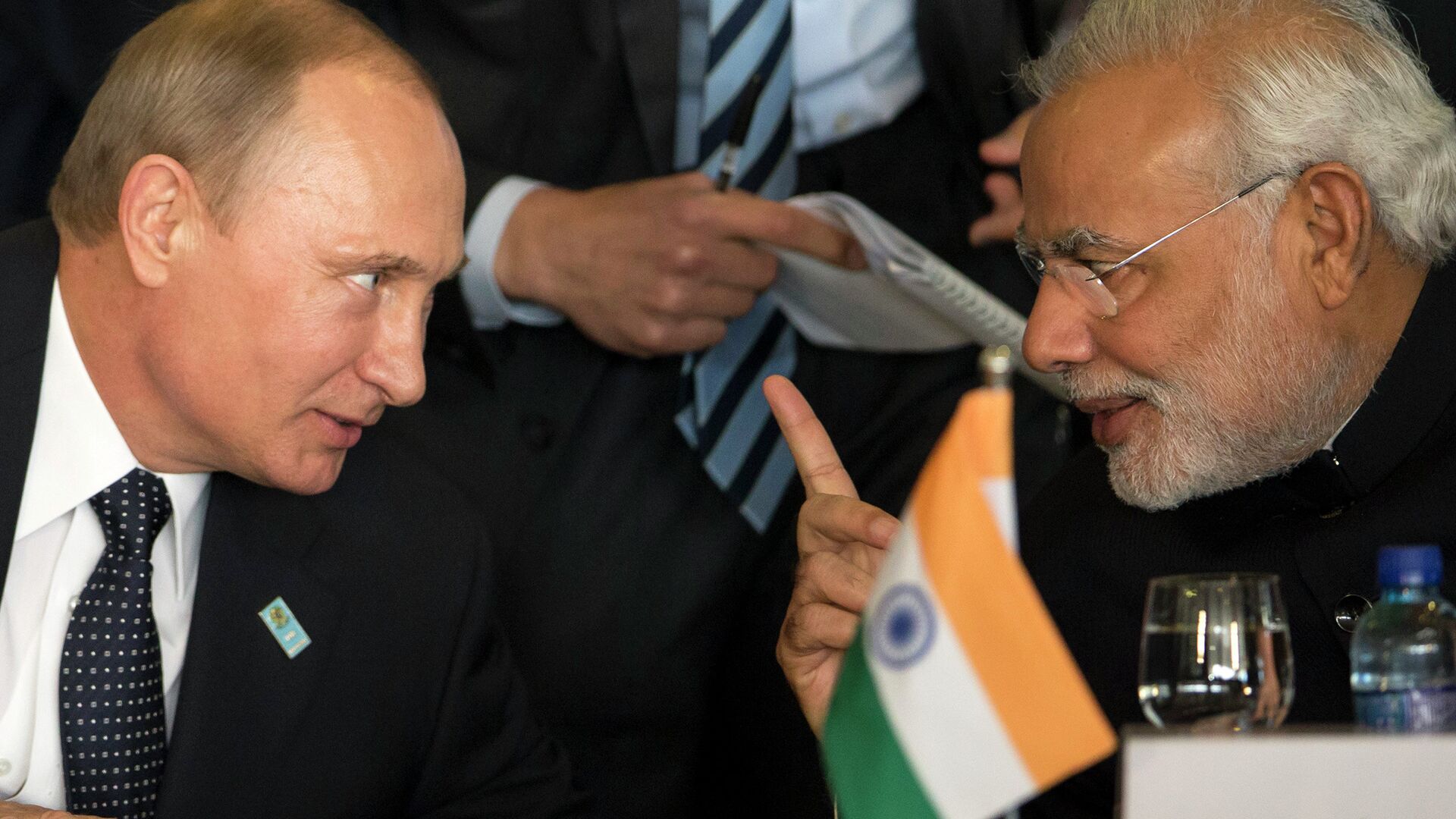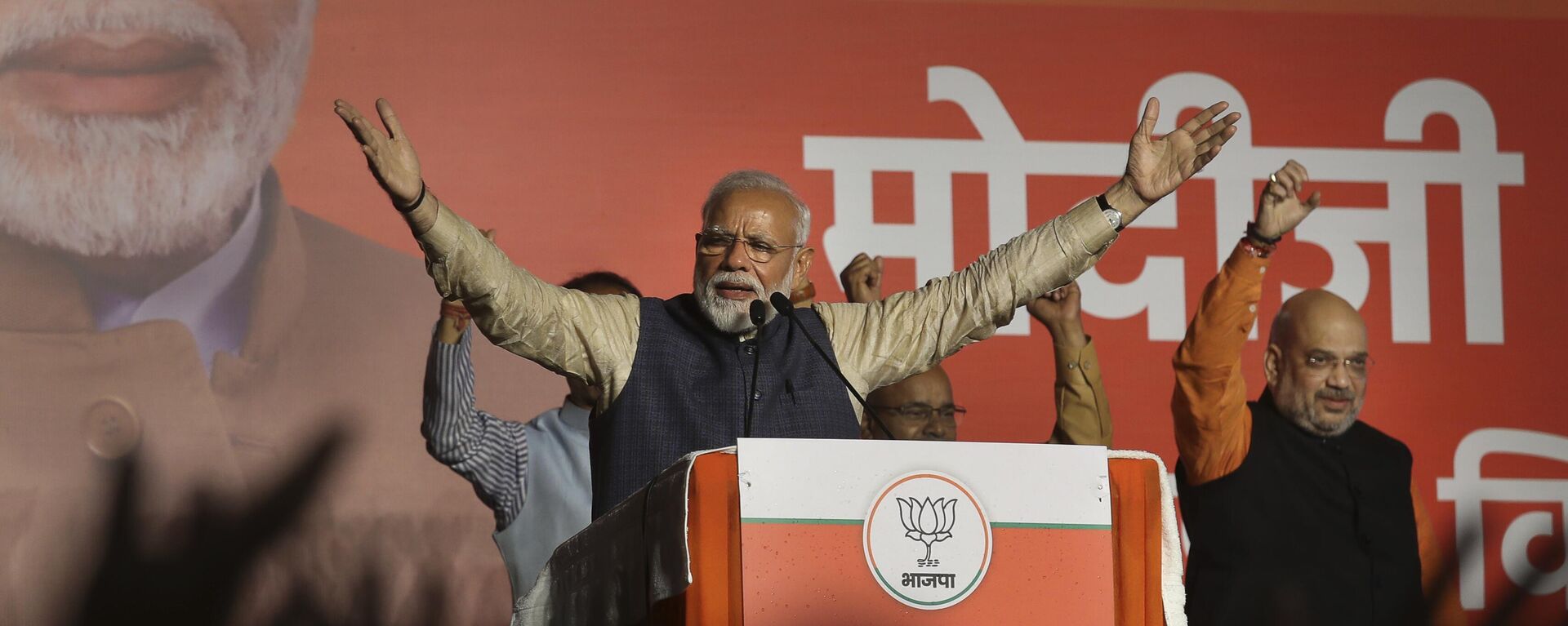Russians Will Be Happy to See BJP’s Victory, the West is Uneasy About It

© AP Photo / Felipe Dana
Subscribe
So, the voting across India will start very soon, and Russian media is waking up to the idea that a very new India is to go on rising after this election. The general mood is upbeat.
"The probable victory of the ruling party may become good news for Moscow. India has become the fastest-growing global economy, notes Mr. Vladimir Skosyrev from The Independent. And, judging by his article’s mood, Russia takes that fact as its own strategic victory," Says Mr. Sergei Strokan from The Kommersant.
That universally positive attitude of all Russians to India is a phenomenon in itself. Whatever is good for India is good for us, that’s the general feeling, spanning several recent decades of Russia’s history.
The experts and the general public both agree on that. And if you want to further strengthen that mood, all you need is to quote, in Russian media, some of the recent British or American publications on the same subject, demonstrating the fact that the new and growing India is causing jitters across the Western political world.
A key dimension? Here we look at an Indian essay, in The Pioneer, titled “No Foreign Policy in Manifestos”. The author, Mr. Kumardeep Banerjee, says that "no political party is telling people about its foreign policy in its election campaign."
He is very sure that “none of the manifestos from political parties, so far, are showing any promise of having dedicated chapters on India’s foreign policy outlook, if their group has majority in June 2024”.
Well, maybe there are some ideas about diplomacy in these manifestos, by now. But, still, the Foreign Affairs author is, essentially, saying that the whole of Indian population is keen on asserting this or that opinion globally. And that’s bad for the nation, the nation should not be so keen.
That’s how it looks, in the text: “When rising states seek global recognition, they often engage in assertive diplomacy and international conduct that provoke backlash, derailing their ascent. And as New Delhi gains influence, its interests will begin to seriously conflict with those of more powerful governments—including Washington’s. An overconfident public could then become a liability for India’s political leadership, forcing it to magnify minor quarrels with other societies and pushing it toward riskier strategies and more uncompromising stances”.
And, further on: “Today, India is embroiled in controversies over extraterritorial assassinations. Tomorrow, its government could find itself embroiled in controversies over the external interrogation of India’s democratic credentials, the treatment of Indians abroad, or China’s growing closeness to India’s smaller neighbors. It might, for example, interfere in the domestic politics of other countries to undermine foreign critics. It could economically bully smaller countries that do not fall in line. Great powers—including the United States—routinely resort to such tactics. But they are also well positioned to manage the consequences. As a rising power, India is still far from that level of global heft and influence”.
Just a moment, people, who was pushing India, year after year, into “containing” China, and is still at it? Being “assertive” in that case obviously does not look like a crime, from these people’s point of view.
But, suddenly, when the current government asserts itself on other matters, the same people tell you that only the “great powers” like the US can do it any time, that is, interfere in other nation’s domestic affairs or bully other states. While India is still far from getting similar rights from folks with “heft and influence”.
At the end of this week I’m going to write my own commentary, for the Russian media, on the significance of the coming vote. I’ll most probably dwell on three points.
One: Russia has several political parties, in and out of parliament, also clubs and societies, not to mention the bubbling cesspool of Internet. We also have a respected caste of Indologists and a lot of other experts on international affairs. And, unless I’m missing something, not one of the mentioned people or groups is worried about the obvious rise of India. Everyone is happy about your nation’s doubling of economy since 2005. All are hoping for yet another victory for BJP in coming June. Nobody is fuming about India being assertive in foreign policy. There are historical and contemporary reasons for that, but there we are, anyway.
Two: yes, there is a perpetual cloud on our horizon, and that’s the constant strain between our two friends, India and China. The cloud was showing its dark head ever since the 60-s, and Moscow’s diplomacy has always been trying to defuse it of all possible electricity. And now we can see much better the reason, why we have been constantly worried about that situation. One thing is, when we have a direct clash of tempers between the two biggest nations in the world. Another thing is, when India is getting a license to assert itself over China, and the powers that issue that license are the same Westerners who are turning our Eastern Europe into a perpetual battle zone. That situation is especially unpleasant if, or when, the same powers are unhappy with India’s unchecked rise and assertiveness over any other matter.
Three: regardless of election’s result, Russia as a power is interested in India’s rise, and this is a part of our long-term expectations, not some immediate reaction to current events. To remind, Russia has just overtaken Germany by GDP by purchasing power parity, getting to the 5th place in the world. But India is #3 on the same list, and nobody expects Russia, with population roughly 10 times smaller, to ever overtake the South Asian giant. We also do not expect the West to crumble down completely, in spite of its obvious deep problems. On the contrary, one is to anticipate some powerful Western attempts to keep its domination where they can and at any price.
So what we really want it a smooth transition. That will have to be a transition to a world without any clear leader, without any dominating and obligatory ideas, something like a co-existence of very different lifestyles and sets of rules. India seems to be an indispensable player for building such a world, assertive when it’s absolutely necessary, compromising and benevolent in other cases.
Dmitry Kosyrev is a Russian writer, author of spy novels and short stories. He also did columns for the Pioneer and Firstpost.com

